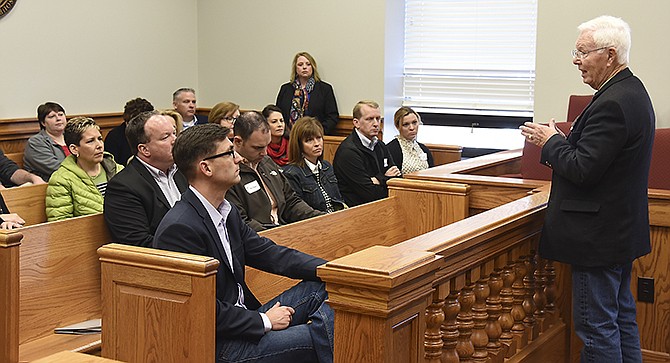In February 1993, Kyle Kendrick was on the job for two days as a case worker when he pulled eight children from their home. He entered the home and climbed the stairs to an upper room where the children were hearing interactions with their father and Missouri Highway Patrol troopers.
The ninth child died from abuse, and the state stepped in to care for the others.
Kendrick, now the children's division regional director within the Department of Social Services, told the children to fill a box with their belongings - clothes, toys and anything they could fit. He scooped up a child in each arm and clutched the box with his hands. It was a moment he said he felt like Superman.
The image of a young girl hugging her worn-out teddy bear is imprinted in Kendrick's mind.
Sharing his story, Kendrick held a teddy bear given to him and about 20 others Friday during the Journey Home Missouri bus tour, sponsored by Jockey Being Family. The Central Missouri Foster Care and Adoption Association coordinated the event, which simulated a child's experience in foster care, and brought together civic leaders, agency representatives and state employees.
For four hours, they went from place to place - a reoccurring theme for foster children. Those speaking during the event - Children's Division representatives, law enforcement, mental health professionals and more - all discussed how the foster care system is full of unknowns for children.
"These kids want to have the best life they can, but they don't know what a better life is," Kendrick said.
The bus tour's first stop was at the Children's Division's Jefferson City offices, where they met with investigators like Sara Crowe. These investigators are the ones who take children out of dangerous situations, including forms of abuse - sexual, physical, emotional - and neglect. Crowe said the investigators try to make light of a dark circumstance. They will take the children out for food, play songs like the "Monster Mash" and play games.
"Trauma comes in a lot of different ways, and we try to make the trauma less memorable when they leave," she said.
New petitions have increased this year in correlation with upswings in substance abuse, violence and abandonment, said Kurt Valentine, children's division juvenile officer. In 2014, the division handled 191 new petitions, and they've filed 225 as of Thursday, he said. Court hearings are required within 72 hours of taking the children, counting weekends and holidays.
With more children coming into the system, the need for Court Appointed Special Advocates (CASA) also increases, said James Kellerman, executive director of the Capital City CASA, inside the Cole County Courthouse. The organization recruits and trains volunteers to act upon a foster child's best interest in the court system.
"I can't train enough volunteers to keep up," Kellerman said.
On stop No. 2, participants met with St. Mary's Hospital physicians, who are sometimes the first to identify child abuse.
Dr. Brian Conley, a pediatrician, shared a case he felt "highlights the failure of the system." A 6-month-old baby from Callaway County came into care three years ago with an apparent cigarette burn, he said, and the child was returned home. When the parents went on a methamphetamine binge, Conley said, the baby died in a trailer home without air conditioning during the summer swelter.
More communication in the system and between county lines could have prevented the death, he said. Conley added a stronger partnership between all children's welfare stakeholders, including health care professionals, would have also helped.
"The medical system failed, the Division of Family Services failed, and so we're left with a dead baby," Conley said.
In the emergency room, Dr. Ted Willmore, St. Mary's Hospital emergency room medical director, said physicians check for non-accidental injuries, which signal abuse. When a child is born, he said there is also a standing order to examine an infant's first bowel movement to determine if the mother used drugs during her pregnancy. If doctors discover concerning factors, Willmore said, they can hotline the case, work with the juvenile department and admit a child.
Other stops on the tour included the home of foster parents Mike and Donnie Twenter and the CMFCAA office.
Michael County, juvenile court administrator at the Prenger Family Center, said the experience reaffirmed the center's mission of assisting children 12 years and older in foster care, who come into the system with emotional baggage. He said a goal is to recruit more foster parents to bring these children into a "forever family."
"There's always a need when it comes to the older foster children," he said. "That's been our biggest focus in Cole County."
Tim Decker, director of the children's division, said the bus tour signaled the need for regular listening to all involved in the system and considering various perspectives.
"What I'm reminded of today is working as a community to care for children is a collaborative endeavour," he said.
CMFCAA Executive Director Deanna Alonso said she hopes those in attendance were motivated to become more involved and potentially become a mentor or volunteer for the organization.

